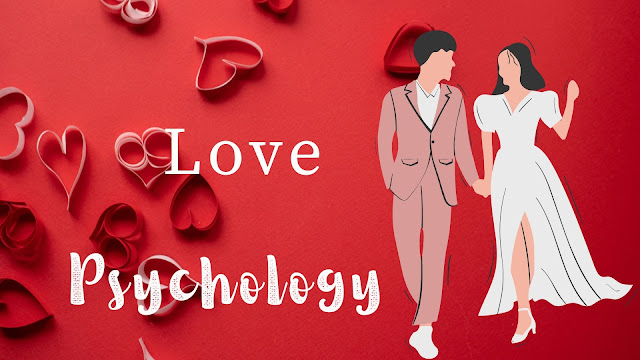TABLE OF CONTENT
- Love Psychology
- Falling in Love Too Fast
- 3 Types of Love Psychology
- Female Psychology of Love
- Male Psychology of Love
- Ignorance in Love
- How to maintain Good Love relationship
Love is an intense feeling of deep affection and care for another person. It is characterized by feelings of warmth, tenderness, and devotion. Love can take many forms, including romantic love, familial love, and love for friends, and is often considered one of the most powerful and transformative emotions. Love can bring people together, create strong bonds, and provide a sense of security and happiness. While it can also bring challenges and difficulties, love is often seen as an essential component of a fulfilling and meaningful life.
Love psychology:
The best gift you can give your Valentine is if you understand your partner, his/her psychology and love psychology. Love psychology refers to the scientific study of love, affection, and relationships. It encompasses various aspects of romantic love, such as attraction, attachment, and attachment styles, as well as the psychological processes and emotions involved in maintaining a loving relationship. Love psychology also considers factors that influence the development and maintenance of love and emotional bonding, such as social and cultural norms, family dynamics, and individual differences in personality and motivation. The goal of love psychology is to better understand the complexities of human love and relationships, and to provide insights and practical advice for individuals seeking to build and maintain healthy, fulfilling relationships.
Falling in Love too Fast:
Falling in love too fast refers to the phenomenon of becoming deeply infatuated with someone in a short amount of time. While falling in love can be an exciting and fulfilling experience, falling in love too fast can also be problematic.
People who fall in love too fast may be more likely to overlook warning signs, make hasty decisions, or ignore important aspects of compatibility. They may also have unrealistic expectations about the relationship and become disappointed or hurt when those expectations are not met.
Additionally, individuals who fall in love too fast may struggle to establish a foundation of trust and emotional stability in a relationship, as they have not had enough time to truly get to know their partner.
It's important to approach new relationships with a sense of caution and to take the time to get to know a potential partner before making a commitment. This can help individuals avoid falling in love too fast and instead develop a strong, healthy, and long-lasting relationship.
3 Types of Love Psychology:
Triangular theory of love:
This theory, developed by psychologist Robert Sternberg, proposes that love is composed of three components: intimacy, passion, and commitment. Intimacy refers to feelings of closeness and connectedness, passion refers to feelings of sexual and romantic attraction, and commitment refers to a decision to maintain the relationship.
Attachment theory:
This theory, developed by psychologist John Bowlby, proposes that early experiences with caregivers shape an individual's attachment style, which then influences their adult relationships. There are three main attachment styles: secure, anxious, and avoidant.
Evolutionary psychology of love:
This perspective views love and romantic relationships from an evolutionary perspective, considering how our ancestral past has influenced the development of love and relationships. This theory suggests that love evolved as a way to ensure the survival and reproduction of our ancestors, and that our modern-day romantic relationships are influenced by this ancestral history.
Fimale Psychology of Love:
The female psychology of love can vary greatly among individuals, but some common themes include the need for emotional connection, security, and a sense of being valued and appreciated. Women may also place a high value on trust, honesty, and communication in romantic relationships. Love can also bring up complex feelings, such as vulnerability, fear of rejection, and concerns about power dynamics in a relationship. Ultimately, the female psychology of love is shaped by a combination of personal experiences, cultural and societal norms, and individual personality traits.
Male Psychology of Love:
Like female psychology, the male psychology of love can vary greatly among individuals, but some common themes include the need for physical and emotional intimacy, a sense of security and stability, and the desire to be admired and respected by a partner. Men may also value autonomy and independence, while seeking a strong connection with their romantic partner. Love can evoke a range of emotions in men, such as excitement, happiness, vulnerability, and fear of rejection. The male psychology of love is influenced by a combination of personal experiences, believe, respect, devote, commitment and individual personality traits.
Ignorance in Love:
Ignorance in love can refer to a lack of understanding or knowledge about one's own feelings or those of a partner. It can also refer to a lack of awareness of relationship dynamics, communication patterns, and other factors that can impact the success of a relationship.
In psychology, ignorance can lead to a number of negative outcomes in love and relationships, such as misunderstandings, conflict, and a breakdown of trust and emotional connection. For example, if individuals are unaware of their own emotional needs or those of their partner, they may struggle to meet those needs and provide the support that their partner needs.
On the other hand, recognizing and overcoming ignorance about love and relationships can lead to greater self-awareness and understanding, which can help individuals develop stronger and more fulfilling relationships. Therefore, it's important for individuals to be proactive in seeking knowledge and understanding about their own emotions and those of their partner, as well as the dynamics of healthy relationships.
How to Maintain good Love relationship:
Maintaining a love relationship requires effort and commitment from both partners. Here are some ways to help maintain a strong and healthy relationship:
- Communication: Open and honest communication is key to resolving conflicts and building trust.
- Quality time: Spending quality time together can help deepen your connection and strengthen your bond.
- Compromise: Being willing to compromise and find mutually acceptable solutions can help resolve conflicts and prevent resentment.
- Emotional support: Offer emotional support and understanding to your partner when they need it.
- Intimacy: Physical and emotional intimacy can help strengthen the bond between partners.
- Independence: Encouraging each other to pursue individual interests and passions can help maintain a sense of independence and prevent boredom.
- Appreciation and gratitude: Expressing appreciation and gratitude for your partner can help increase feelings of love and affection.
- Flexibility: Being flexible and adaptable to changes can help keep the relationship strong and resilient.
- Honesty: Being honest and transparent about your thoughts, feelings, and actions can help build trust and strengthen the relationship.
- Individual growth: Encourage and support each other's personal growth and interests outside of the relationship.
- Resolve conflicts: Conflicts are inevitable in any relationship, but it's important to learn healthy ways to resolve them and move forward.
Remember, relationships take effort and work to maintain, but the effort is worth it for a happy and loving partnership.















0 comments:
Post a Comment
Thank you for your response